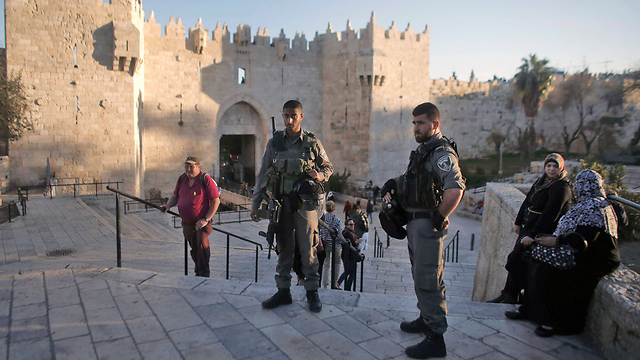Plan includes construction of 10 new police stations and renovation of 10 existing ones in Arab or mixed cities, and adding 2,600 new officers to force.
The Israeli government approved on Sunday a multi-year plan to improve law enforcement in the Arab sector and in Jerusalem.
The plan, which seeks to gradually reduce the high crime rates in the Arab sector, is expected to cost several billions of shekels and be implemented starting this year and until 2020.
Public Security Minister Gilad Erdan, who initiated the plan, says it aims to narrow social gaps between Jews and Arabs in Israel, as well as economically integrate the Arab population in the Israeli society. This, the minister says, will also help increase the personal security of residents in Jerusalem and the entire Arab sector.
Erdan said the decision was “no less than a historic one.”

“We want equality in law enforcement,” said Prime Minister Benjamin Netanyahu.
“This equality does not exist in Jerusalem and the Arab public is paying dearly. The State of Israel is paying dearly. We want a single nation of law without enclaves in which the law is not upheld. We also want to reduce other gaps in society at large and in Israeli Arab society. We want to integrate them in all walks of life in the country – and this is what we will do. The step that we are taking today will reduce the gaps in law enforcement and increase personal security.”
The plan will include the construction of 10 new police stations in Arab or mixed cities, and the renovation of 10 existing police stations in Nazareth, Misgav, Shfar’am, Karmiel, Migdal HaEmek, Umm al-Fahm, Tayibe, Tira (Kedma), Kafr Qasim and Rahat.
Erdan said the construction of new stations and renovation of existing ones will be prioritized according to the level of crime in the community. “So we’ll first provide an answer to communities that have the highest level of crime, in order to improve law enforcement there and increase the personal security of the residents,” he said.
In addition, 2,600 new police officer positions will be added at the cost of NIS 2 billion to Arab and mixed cities.
The plan will be implemented in several stages. In the first stage, taking place in 2016, 500 new officers will be added to the force at the cost of NIS 100 million, with funding taken from the Interior Ministry. The rest of the necessary financing, up to NIS 100 million, will be allocated as a one-time payment from the Finance Ministry.
For 2017, the government will seek funding for 200 of the 500 officer positions in the new state budget, but if the appropriate funding cannot be secured in the budget these positions, police will cut back on recruitment of new officers in 2017 to allow for these positions.
The second stage of the plan, which includes the building of new police stations and the renovating of existing ones will require approval and the allocation of resources.
The plan also includes a renewed deployment of forces in Jerusalem and “significantly strengthening the enforcement and deterrence in Jerusalem, and the ability to provide enforcement services to all parts of the city, including East Jerusalem,” Erdan said.
As reported by Ynetnews
